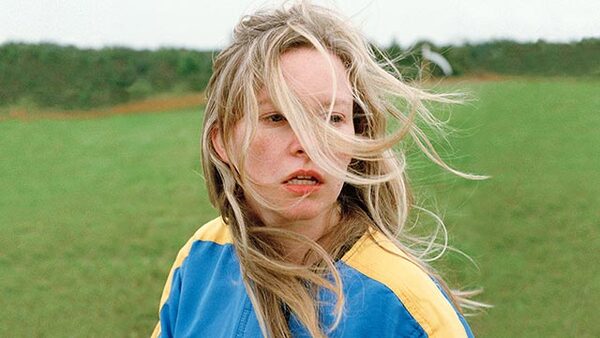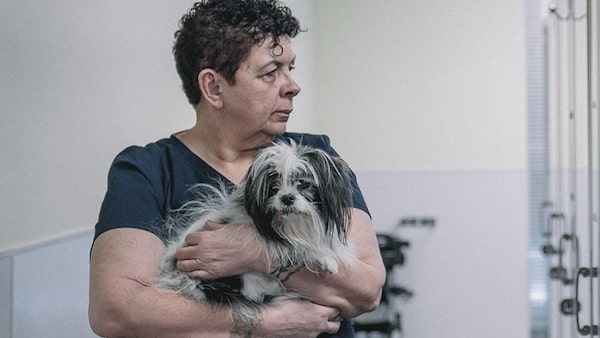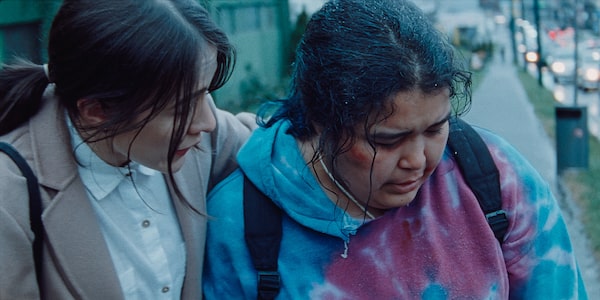
Deragh Campbell plays Anne in Anne at 13,000 ft.Courtesy of TIFF
Attempting to find a common thread in an annual wrap-up of Canadian cinema is a fool’s errand. Aside from the unifying factors of low budgets and lower exposure, there isn’t much in the way of theme or execution to tie together, say, the latest domestic drama from Quebec’s Xavier Dolan to the latest convention-demolishing feature from whichever young talent is making waves in Toronto. But with this year’s TIFF’s Canada’s Top Ten list (17 years strong, still as awkwardly named as ever), a common thread has emerged: age. Or the lack thereof.
This year’s ranking of both feature films and shorts, compiled by the Toronto International Film Festival’s programming team in collaboration with industry experts and released Wednesday morning, is composed predominantly of new-guard artists. In the features category, three titles are directorial debuts (Nicole Dorsey’s Black Conflux, Heather Young’s Murmur, and Matthew Rankin’s The Twentieth Century). Another, The Body Remembers When the World Broke Open, is co-directed by a first-timer, Elle-Maija Tailfeathers, alongside Kathleen Hepburn, who’s only on her second feature. Anne at 13,000 ft. marks only the third film from Kazik Radwanski. And all but one filmmaker on the list, 62-year-old Zacharias Kunuk (One Day in the Life of Noah Piugattuk), is under the age of 50.
More familiar names whom some audiences might imagine as the country’s legacy filmmakers – Atom Egoyan, François Girard, Denys Arcand, Bruce McDonald – are absent from the 2019 collection, even though each aforementioned director released a new film this calendar year. Indeed, the most prolific name on the new list – Dolan, recognized for his eighth feature, Matthias & Maxime – is also its youngest, at 30 years old.

Murmur made its world premiere at TIFF this past September.Courtesy of TIFF
“This is a very exciting time – there are affecting, inspiring films being made in Canada by new and bold artists, and they’re beginning to get some of the exposure that they deserve,” says Halifax’s Young, whose character study Murmur made its world premiere at TIFF this past September, a feat that the filmmaker credits to Telefilm’s revamped micro-budget program. “A low-budget funding stream for first-time feature filmmakers is having a big impact, because it’s giving realistic access to funding for new voices.”
Also of note is the fact that the 2019 list features four Indigenous filmmakers (Tailfeathers, Kunuk, and Eva Kaukai and Manon Chamberland, directors of the short film Throat Singing in Kangirsuk), a significant jump compared to the single Indigenous production featured on 2018′s list (Gwaai Edenshaw and Helen Haig-Brown’s Edge of the Knife).
“There’s a huge build of momentum amongst Indigenous filmmakers that is really a global wave that has been a long time in the making, and it’s a beautiful thing to witness,” says Hepburn, whose film with Tailfeathers is already garnering praise in the United States since it’s become available to stream on Netflix. “We don’t know exactly how it’s performing, but we’ve been told its numbers are good,” she adds. “We were so amazed to see it listed in the ‘Trending Now’ category on our first weekend.”
Yet, despite the momentum Indigenous filmmakers have made this year – in addition to making TIFF’s list, The Body Remembers was shortlisted this past Sunday for the Toronto Film Critics Association’s $100,000 Rogers Best Canadian Film Award – Hepburn and Tailfeathers don’t see it as evidence that the system is necessarily working, but more so proof that there’s a growing desire from audiences for new stories.

The Body Remembers When the World Broke Open will screen at TIFF Lightbox starting this Friday, December 13.Handout
“As an Indigenous filmmaker, I am proud to belong to such a thriving community. But to be quite frank, I have mixed feelings about the current state of the Canadian film landscape,” Tailfeathers says, citing last week’s restructuring at the National Film Board, which saw the elimination of two executive director positions, including Michelle van Beusekom, a widely recognized champion of Indigenous cinema.
“We are witnessing the ways in which institutions are failing to honour their commitments, which is deeply disappointing. Indigenous people have fought hard for a seat at the table and have offered numerous gestures of respect in hopes that institutions are willing to listen, adapt and grow," Tailfeathers says. "However, institutions can often get it wrong, particularly when deeply ingrained paternalistic attitudes toward Indigenous peoples prevail. Institutional change also requires responsible leadership. That being said, there are allies within institutions who are listening and actively working toward something better.”
As with all selections in TIFF’s Canada’s Top 10, The Body Remembers When the World Broke Open was offered a theatrical run at the TIFF Lightbox, and will screen there starting this Friday. (Sophie Deraspe’s Antigone, another Top 10 2019 selection, started its Lightbox run Dec. 6). Other titles – including Louise Archambault’s And the Birds Rained Down and Calvin Thomas and Yonah Lewis’s White Lie – will have the opportunity to play the Lightbox in the new year, while the short films will be screened in a program format on Jan. 26.
Live your best. We have a daily Life & Arts newsletter, providing you with our latest stories on health, travel, food and culture. Sign up today.
 Barry Hertz
Barry Hertz